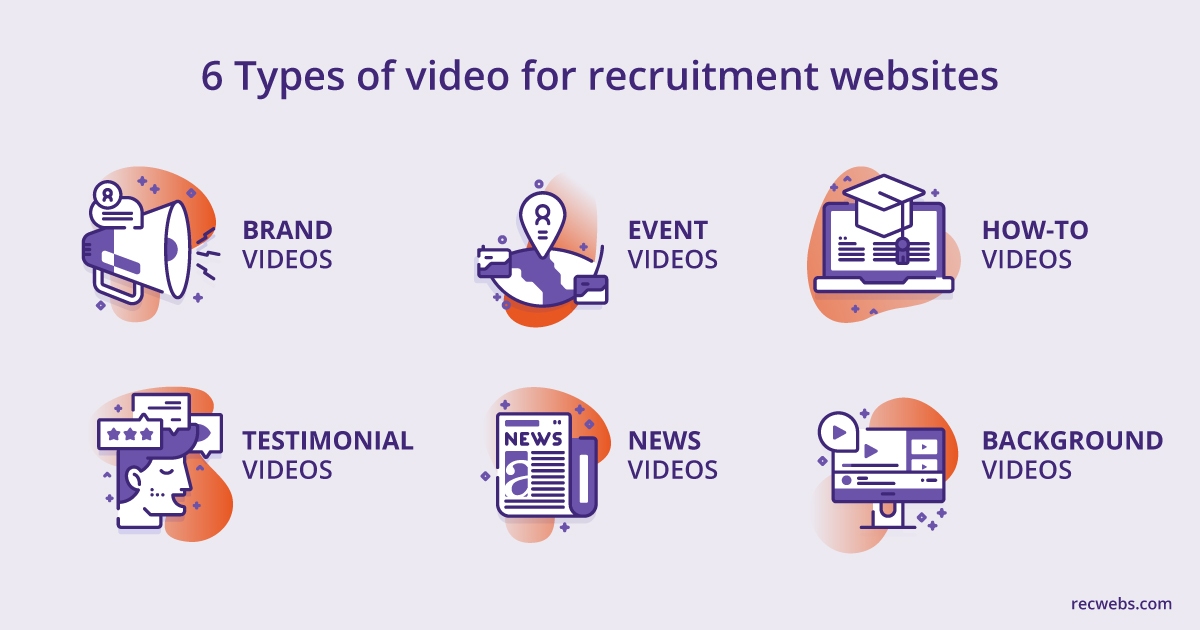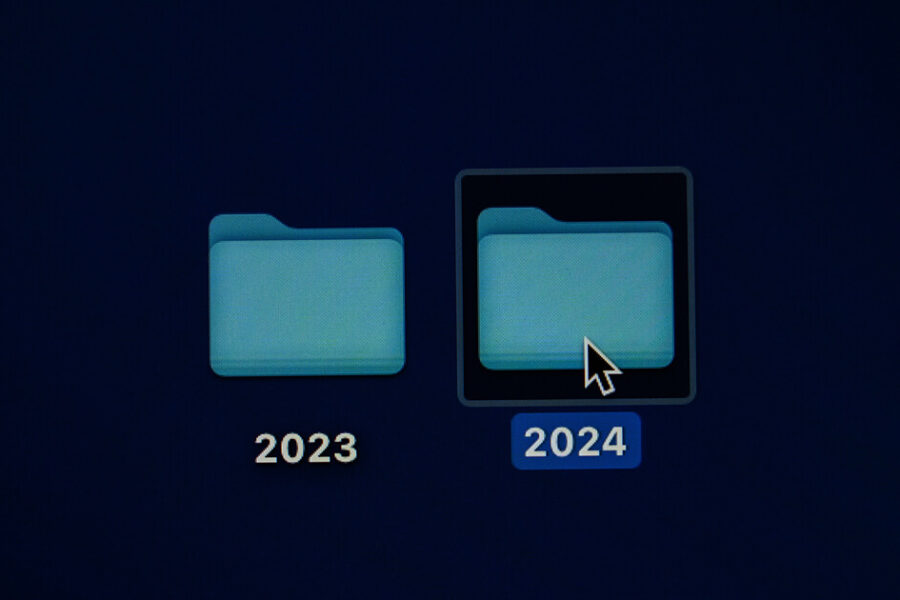Online video is everywhere. Scroll through any of your social media channels and a huge amount of the content will be in the form of video.
Multinational technology conglomerate Cisco has recently forecasted that online videos will make up more than 82% of all consumer internet traffic by 2022 and tech review website tech.co has listed video content as one of the six biggest social media trends of 2021. Video has undeniably become a huge trend in content marketing but is it right for your recruitment website?
IN THIS ARTICLE
According to the Content Marketing Institute, website users are around ten times more likely to engage with video content than any other form of media. However, video isn’t right for every business or every website. Consider your demographic, the quality of video you can produce, whether you have the time to invest in it, and how video would work with the other content on your website before you decide whether it is the right media for you.
Pros of video on your recruitment website
Increased engagement
Visitors engaging with your content rather than passively scrolling is likely to increase your conversion rate massively. If they’re engaged, they’re more invested and they will stay on your page for longer. Search engines recognise and reward this with higher rankings as it means the page has value so it can be great for SEO purposes. Engaging visitors through video will mean they are more likely to seek out further information on your website. Including video interviews with leaders in the industry you recruit within, advice for candidates, or helpful webinars can be far more engaging than solely publishing written content – if done in the right way. For the biggest impact, written and video content should work together.
Increased approachability
Incorporating videos onto your homepage, About Us, and/or Meet the Team pages gives you greater opportunity to inject personality and strengthen your brand. The ability to show rather than just tell potential clients and candidates why they should work with you rather than any other recruitment agency has huge value. You are far more likely to connect with a visitor to your website via a personable video than through words alone and that connection is so important in recruitment. Done right, video can create trust and bridge that gap between your digital persona and potential clients and candidates.
Cons of video on your recruitment website
Accessibility issues
Technological developments have meant that video content is more accessible than ever before but there are still many who have poor or unreliable internet connections, especially those living rurally.
Accessing quality video via mobile may be harder, especially if you are travelling in and out of hot spots. Given RecWebs data has shown that 43% of visits to recruitment websites are via a mobile device, that is a huge consideration. Depending on the quality of your internet, videos can cause page load speeds to drop dramatically which could be enough for a user to click away onto another site.
RecWebs data has also found that the bounce rate increases by 32% at just 2 seconds, rising to 123% probability of bounce at 10 seconds, which is 0.3 seconds from the average time a recruitment website takes to fully load. And there is the issue of disability accessibility to consider. Having a fully accessible recruitment website will ensure that you are not limiting your reach and, by extension, your talent pool.
Not everyone is a fan of video
It’s important to consider the ways in which visitors to recruitment websites prefer to consume content. Although data suggests that a huge number engage more with video content, much of that number will be consumers browsing different lifestyle brands. Those searching for information and news-based content may prefer to read text in order to quickly find what they’re looking for. According to data from the Reuters Institute and Oxford University, 41% of millennial media consumers prefer reading news content to watching video, claiming it’s faster and more convenient. If, for example, a candidate arrives at your website wanting to find whether you recruit in their geographical area or at their level, they will want to scan your text for the answer rather than sit through a video.

The 6 different types of video on recruitment websites
Brand videos
In recruitment, your people are your business. Videos that showcase them and the way your team works with both clients and candidates can be powerful. Consider embedding these on your About Us or Meet the Team pages as a way for visitors to make those connections that a static website would struggle to achieve.
Event videos
Attending an exhibition or hosting your own event? You could either livestream or provide a highlights video – or both!
How-tos
Videos offering helpful advice can be great for both candidates and clients. Consider a series on interview techniques or CV writing for candidates, or flip it and record a video on how to conduct an interview and what to look for in a CV for clients. Not only do these provide value, they establish your expertise, knowledge and credibility.
Testimonial videos
Testimonials are an incredibly valuable marketing tool. They build brand credibility and convert leads. Video testimonials can be even more powerful as they humanise the words and increase trust. Watching a happy client or candidate talk about your services is more compelling than reading their words on a screen.
News videos
Won an award? Let the world know! Recruited someone new? Introduce them. Moved premises? Give a tour. Fundraising? Show your charitable work. Attending a big event? Share details, build excitement and invite clients.
Background videos
These play behind the text on a page and create atmosphere, establishing a certain mood for your website rather than delivering information. It is vital they don’t distract from the information being displayed but rather play subtly in the background for effect.
For the record
What you’ll need to record your videos will depend on the type of video you’re producing. For personal, talking heads type videos all you really need is a good smartphone. Simply use your phone’s built-in camera or a specialised app that will automatically add captions (Clips or Clipomatic are great for iPhone). A tripod is useful to prevent shaky camerawork but anything that will stabilise your phone will work. For screen videos, or screen capture, which will record your screen with captions and audio narration, you’ll need screen capture software. The most popular free option is Loom which integrates with Chrome. After you’ve finished recording you’ll be able to combine, edit and add other effects using the screen capture software.
Size matters
The general rule of thumb is to keep it short unless a) you’re certain of its value or b) it’s a webinar or training video. The intro should be concise and demonstrate immediate value or you will lose viewers in the first few seconds.
Data collated by tech.co revealed that the average person’s attention span is 8 seconds – just 1 second less than a goldfish – so the importance of engaging users straight away cannot be overstated. Keep the energy high and the content relevant. tech.co also found that 52% prefer informational videos to be between 3-6 minutes long (depending on the content and platform). If you’re planning on sharing on social media, your videos should be particularly snappy – around 60 seconds for LinkedIn or Facebook. If you have editing software you could create shorter versions of videos on your website for your social media channels. Video has great repurposing value.
Video tips
- If you decide to include video on your website, we’d strongly urge the provision of text-based alternatives such as transcription or even a standalone accompaniment so that those accessing your website via a mobile device can do so without using sound. This will also make the video more accessible for those with visual impairment.
- Ensure your videos aren’t too long or you risk visitors clicking away. Engage them immediately and hold their attention.
- Be clear about what you want to say. A video without a clear goal is a waste of everyone’s time.
- Include text content on the page too – a combination of both will appeal to the greatest number of visitors.
- Videos are an exercise in branding so ensure you’re using the colours from your logo and that the subject matter, images, tone of voice, music, etc. are all appropriate for your business and your audience.
The bottom line is that video is an easy way to consume content and is an increasingly familiar way to do so. Ultimately, however, you need to ask the one overriding question that you should pose before you add any content to your website – does it provide value? Lastly, remember that video is merely one part of your website, one component alongside many others that together make a recruitment website that attracts both candidates and clients, boosts your brand, promotes your jobs, and wins you new business.





